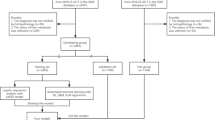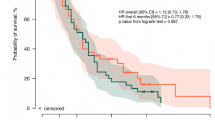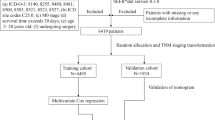Abstract
Introduction
Surgery represents a primary therapeutic approach for borderline resectable and locally advanced pancreatic cancer (BR/LAPC). However, BR/LAPC lesions exhibit high heterogeneity and not all BR/LAPC patients who undergo surgery can derive beneficial outcomes. The present study aims to employ machine learning (ML) algorithms to identify those who would obtain benefits from the primary tumor surgery.
Methods
We retrieved clinical data of patients with BR/LAPC from the Surveillance, Epidemiology, and End Results (SEER) database and classified them into surgery and non-surgery groups based on primary tumor surgery status. To eliminate confounding factors, propensity score matching (PSM) was employed. We hypothesized that patients who underwent surgery and had a longer median cancer-specific survival (CSS) than those who did not undergo surgery would certainly benefit from surgical intervention. Clinical and pathological features were utilized to construct six ML models, and model effectiveness was compared through measures such as the area under curve (AUC), calibration plots, and decision curve analysis (DCA). We selected the best-performing algorithm (i.e., XGBoost) to predict postoperative benefits. The SHapley Additive exPlanations (SHAP) approach was used to interpret the XGBoost model. Additionally, data from 53 Chinese patients prospectively collected was used for external validation of the model.
Results
According to the results of the tenfold cross-validation in the training cohort, the XGBoost model yielded the best performance (AUC = 0.823, 95%CI 0.707–0.938). The internal (74.3% accuracy) and external (84.3% accuracy) validation demonstrated the generalizability of the model. The SHAP analysis provided explanations independent of the model, highlighting important factors related to postoperative survival benefits in BR/LAPC, with age, chemotherapy, and radiation therapy being the top three important factors.
Conclusion
By integrating of ML algorithms and clinical data, we have established a highly efficient model to facilitate clinical decision-making and assist clinicians in selecting the population that would benefit from surgery.






Similar content being viewed by others
Data availability statement
This investigation conducted an analysis on publicly available datasets, which can be accessed at the following link: https://seer.cancer.gov/data/.
References
Chen X, Yi B, Liu Z, Zou H, Zhou J, Zhang Z, Xiong L, Wen Y (2020) Global, regional and national burden of pancreatic cancer, 1990 to 2017: results from the Global Burden of Disease Study 2017. Pancreatology 20(3):462–469. https://doi.org/10.1016/j.pan.2020.02.011
Christians KK, Tsai S, Mahmoud A, Ritch P, Thomas JP, Wiebe L, Kelly T, Erickson B, Wang H, Evans DB, George B (2014) Neoadjuvant FOLFIRINOX for borderline resectable pancreas cancer: a new treatment paradigm? Oncologist 19(3):266–274. https://doi.org/10.1634/theoncologist.2013-0273
Cloyd JM, Chen HC, Wang X, Tzeng CD, Kim MP, Aloia TA, Vauthey JN, Lee JE, Katz MHG (2019) Chemotherapy versus chemoradiation as preoperative therapy for resectable pancreatic ductal adenocarcinoma: a propensity score adjusted analysis. Pancreas 48(2):216–222. https://doi.org/10.1097/mpa.0000000000001231
Cohen SJ, Dobelbower R Jr, Lipsitz S, Catalano PJ, Sischy B, Smith TJ, Haller DG (2005) A randomized phase III study of radiotherapy alone or with 5-fluorouracil and mitomycin-C in patients with locally advanced adenocarcinoma of the pancreas: Eastern Cooperative Oncology Group study E8282. Int J Radiat Oncol Biol Phys 62(5):1345–1350. https://doi.org/10.1016/j.ijrobp.2004.12.074
Eisenhauer EA, Therasse P, Bogaerts J, Schwartz LH, Sargent D, Ford R, Dancey J, Arbuck S, Gwyther S, Mooney M, Rubinstein L, Shankar L, Dodd L, Kaplan R, Lacombe D, Verweij J (2009) New response evaluation criteria in solid tumours: revised RECIST guideline (version 1.1). Eur J Cancer 45(2):228–247. https://doi.org/10.1016/j.ejca.2008.10.026
Ferrone CR, Marchegiani G, Hong TS, Ryan DP, Deshpande V, McDonnell EI, Sabbatino F, Santos DD, Allen JN, Blaszkowsky LS, Clark JW, Faris JE, Goyal L, Kwak EL, Murphy JE, Ting DT, Wo JY, Zhu AX, Warshaw AL, Lillemoe KD, Fernández-del Castillo C (2015) Radiological and surgical implications of neoadjuvant treatment with FOLFIRINOX for locally advanced and borderline resectable pancreatic cancer. Ann Surg 261(1):12–17. https://doi.org/10.1097/sla.0000000000000867
Freelove R, Walling AD (2006) Pancreatic cancer: diagnosis and management. Am Fam Physician 73(3):485–492
Friess H, Lu Z, Graber HU, Zimmermann A, Adler G, Korc M, Schmid RM, Büchler MW (1998) bax, but not bcl-2, influences the prognosis of human pancreatic cancer. Gut 43(3):414–421. https://doi.org/10.1136/gut.43.3.414
Hartwig W, Vollmer CM, Fingerhut A, Yeo CJ, Neoptolemos JP, Adham M, Andrén-Sandberg A, Asbun HJ, Bassi C, Bockhorn M, Charnley R, Conlon KC, Dervenis C, Fernandez-Cruz L, Friess H, Gouma DJ, Imrie CW, Lillemoe KD, Milićević MN, Montorsi M, Shrikhande SV, Vashist YK, Izbicki JR, Büchler MW (2014) Extended pancreatectomy in pancreatic ductal adenocarcinoma: definition and consensus of the International Study Group for Pancreatic Surgery (ISGPS). Surgery 156(1):1–14. https://doi.org/10.1016/j.surg.2014.02.009
Jin F, Yang L, Wang W, Yuan N, Zhan S, Yang P, Chen X, Ma T, Wang Y (2021) A novel class of tsRNA signatures as biomarkers for diagnosis and prognosis of pancreatic cancer. Mol Cancer 20(1):95. https://doi.org/10.1186/s12943-021-01389-5
Kang MJ, Jang JY, Kwon W, Kim SW (2018) Clinical significance of defining borderline resectable pancreatic cancer. Pancreatology 18(2):139–145. https://doi.org/10.1016/j.pan.2017.12.003
Katz MHG, Varadhachary GR (2019) Borderline resectable pancreatic cancer-At the crossroads of precision medicine. Cancer 125(10):1584–1587. https://doi.org/10.1002/cncr.31936
Li X, Guo C, Li Q, Wei S, Zhang Q, Chen Y, Shen Y, Ma T, Li G, Gao S, Que R, Lou J, Yu R, Yuan Y, Wei Q, Huang P, Liang T, Bai X (2019) Association of modified-FOLFIRINOX-regimen-based neoadjuvant therapy with outcomes of locally advanced pancreatic cancer in Chinese population. Oncologist 24(3):301-e393. https://doi.org/10.1634/theoncologist.2018-0696
Moertel CG, Frytak S, Hahn RG, O’Connell MJ, Reitemeier RJ, Rubin J, Schutt AJ, Weiland LH, Childs DS, Holbrook MA, Lavin PT, Livstone E, Spiro H, Knowlton A, Kalser M, Barkin J, Lessner H, Mann-Kaplan R, Ramming K, Douglas HO Jr, Thomas P, Nave H, Bateman J, Lokich J, Brooks J, Chaffey J, Corson JM, Zamcheck N, Novak JW (1981) Therapy of locally unresectable pancreatic carcinoma: a randomized comparison of high dose (6000 rads) radiation alone, moderate dose radiation (4000 rads + 5-fluorouracil), and high dose radiation + 5-fluorouracil: the Gastrointestinal Tumor Study Group. Cancer 48(8):1705–1710. https://doi.org/10.1002/1097-0142(19811015)48:8%3c1705::aid-cncr2820480803%3e3.0.co;2-4
Ngiam KY, Khor IW (2019) Big data and machine learning algorithms for health-care delivery. Lancet Oncol 20(5):e262–e273. https://doi.org/10.1016/s1470-2045(19)30149-4
Park W, Chawla A, O’Reilly EM (2021) Pancreatic cancer: a review. JAMA 326(9):851–862. https://doi.org/10.1001/jama.2021.13027
Rawla P, Sunkara T, Gaduputi V (2019) Epidemiology of pancreatic cancer: global trends, etiology and risk factors. World J Oncol 10(1):10–27. https://doi.org/10.14740/wjon1166
Reames BN, Blair AB, Krell RW, Groot VP, Gemenetzis G, Padussis JC, Thayer SP, Falconi M, Wolfgang CL, Weiss MJ, Are C, He J (2021) Management of locally advanced pancreatic cancer: results of an international survey of current practice. Ann Surg 273(6):1173–1181. https://doi.org/10.1097/sla.0000000000003568
Siegel RL, Miller KD, Fuchs HE, Jemal A (2022) Cancer statistics, 2022. CA Cancer J Clin 72(1):7–33. https://doi.org/10.3322/caac.21708
Sung H, Ferlay J, Siegel RL, Laversanne M, Soerjomataram I, Jemal A, Bray F (2021) Global cancer statistics 2020: GLOBOCAN estimates of incidence and mortality worldwide for 36 cancers in 185 countries. CA Cancer J Clin 71(3):209–249. https://doi.org/10.3322/caac.21660
Tempero MA, Malafa MP, Al-Hawary M, Behrman SW, Benson AB, Cardin DB, Chiorean EG, Chung V, Czito B, Del Chiaro M, Dillhoff M, Donahue TR, Dotan E, Ferrone CR, Fountzilas C, Hardacre J, Hawkins WG, Klute K, Ko AH, Kunstman JW, LoConte N, Lowy AM, Moravek C, Nakakura EK, Narang AK, Obando J, Polanco PM, Reddy S, Reyngold M, Scaife C, Shen J, Vollmer C, Wolff RA, Wolpin BM, Lynn B, George GV (2021) Pancreatic adenocarcinoma, version 2.2021, NCCN clinical practice guidelines in oncology. J Natl Compr Canc Netw 19(4):439–457. https://doi.org/10.6004/jnccn.2021.0017
Tsujimoto A, Sudo K, Nakamura K, Kita E, Hara R, Takayama W, Ishii H, Yamaguchi T (2019) Gemcitabine plus nab-paclitaxel for locally advanced or borderline resectable pancreatic cancer. Sci Rep 9(1):16187. https://doi.org/10.1038/s41598-019-52486-x
Van Laethem JL, Verslype C, Iovanna JL, Michl P, Conroy T, Louvet C, Hammel P, Mitry E, Ducreux M, Maraculla T, Uhl W, Van Tienhoven G, Bachet JB, Maréchal R, Hendlisz A, Bali M, Demetter P, Ulrich F, Aust D, Luttges J, Peeters M, Mauer M, Roth A, Neoptolemos JP, Lutz M (2012) New strategies and designs in pancreatic cancer research: consensus guidelines report from a European expert panel. Ann Oncol 23(3):570–576. https://doi.org/10.1093/annonc/mdr351
Versteijne E, van Eijck CH, Punt CJ, Suker M, Zwinderman AH, Dohmen MA, Groothuis KB, Busch OR, Besselink MG, de Hingh IH, Ten Tije AJ, Patijn GA, Bonsing BA, de Vos-Geelen J, Klaase JM, Festen S, Boerma D, Erdmann JI, Molenaar IQ, van der Harst E, van der Kolk MB, Rasch CR, van Tienhoven G (2016) Preoperative radiochemotherapy versus immediate surgery for resectable and borderline resectable pancreatic cancer (PREOPANC trial): study protocol for a multicentre randomized controlled trial. Trials 17(1):127. https://doi.org/10.1186/s13063-016-1262-z
White RR, Paulson EK, Freed KS, Keogan MT, Hurwitz HI, Lee C, Morse MA, Gottfried MR, Baillie J, Branch MS, Jowell PS, McGrath KM, Clary BM, Pappas TN, Tyler DS (2001) Staging of pancreatic cancer before and after neoadjuvant chemoradiation. J Gastrointest Surg 5(6):626–633. https://doi.org/10.1016/s1091-255x(01)80105-0
Yoo C, Shin SH, Kim KP, Jeong JH, Chang HM, Kang JH, Lee SS, Park DH, Song TJ, Seo DW, Lee SK, Kim MH, Park JH, Hwang DW, Song KB, Lee JH, Ryoo BY, Kim SC (2019) Clinical outcomes of conversion surgery after neoadjuvant chemotherapy in patients with borderline resectable and locally advanced unresectable pancreatic cancer: a single-center, retrospective analysis. Cancers (basel) 11(3):278. https://doi.org/10.3390/cancers11030278
Yu J, Ohuchida K, Mizumoto K, Sato N, Kayashima T, Fujita H, Nakata K, Tanaka M (2010) MicroRNA, hsa-miR-200c, is an independent prognostic factor in pancreatic cancer and its upregulation inhibits pancreatic cancer invasion but increases cell proliferation. Mol Cancer 9:169. https://doi.org/10.1186/1476-4598-9-169
Acknowledgements
We extend our profound gratitude to the SEER program for granting approval for registration and providing access to the SEER database.
Funding
This study was financially supported by the Ningbo Natural Science Foundation (2019A610208).
Author information
Authors and Affiliations
Contributions
Study conception: LMZ and ZHY. Data collection: ZHY and RJ. Statistical analysis: LMZ and XAY. Article writing and revision: LMZ and DJY. All authors contributed to the article and have approved the version submitted for publication.
Corresponding author
Ethics declarations
Conflict of interest
We declare that the research was conducted in the absence of any commercial or financial relationships that could be construed as a potential conflict of interest.
Ethics statement
The human participation studies were reviewed and approved by the Ethics Committee of The Affiliated Lihuili Hospital, Ningbo University, Ningbo, Zhejiang, China. Written informed consent requirement was waived by the committee.
Additional information
Publisher's Note
Springer Nature remains neutral with regard to jurisdictional claims in published maps and institutional affiliations.
Supplementary Information
Below is the link to the electronic supplementary material.
Rights and permissions
Springer Nature or its licensor (e.g. a society or other partner) holds exclusive rights to this article under a publishing agreement with the author(s) or other rightsholder(s); author self-archiving of the accepted manuscript version of this article is solely governed by the terms of such publishing agreement and applicable law.
About this article
Cite this article
Zhang, L., Yu, Z., Jin, R. et al. Machine learning-based prediction of surgical benefit in borderline resectable and locally advanced pancreatic cancer. J Cancer Res Clin Oncol 149, 11857–11871 (2023). https://doi.org/10.1007/s00432-023-05071-9
Received:
Accepted:
Published:
Issue Date:
DOI: https://doi.org/10.1007/s00432-023-05071-9




